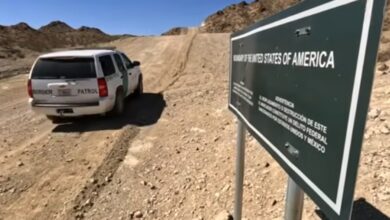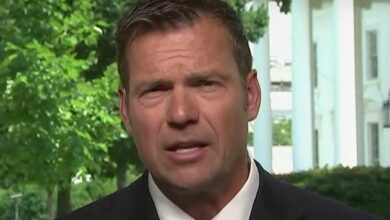Could seized drug kingpin money be used for wall?
Could money seized from Mexican Sinaloa cartel kingpin, Joaquin “El Chapo” Guzman be used to partially fund a border wall? That’s what some lawmakers think.
Sen. Ted Cruz (R-Texas) and 15 House Republicans led by Rep. Mo Brooks (R-Ala.) think they can end the standoff between President Donald Trump and Speaker of the House Nancy Pelosi (D-Calif.) on funding for a wall on the border with Mexico.
The funds could come from a proposal called the “Ensuring Lawful Collection of Hidden Assets to Provide Order Act,” or “El Chapo Act” for short. It refers to assets forfeited by “El Chapo” Guzman, and other drug lords prosecuted in recent years on multiple charges related to smuggling heroin and other illegal drugs into the United States.
Guzman presently faces 17 charges in a federal court in Brooklyn, New York, and could get a life sentence if convicted. He was extradited from Mexico in 2017 after U.S. officials agreed not to seek the death penalty.
The bill introduced by the Republican legislators refers to accessing El Chapo’s bank accounts and any other of his many assets that U.S. authorities can locate and confiscate.
Estimates of the value of the captured drug lord’s assets run as high as $14 billion, but they can be difficult to trace because cartel leaders like Guzman use every means possible to hide them.
“What the El Chapo Act does is really simple,” said Cruz, on a YouTube video he made for the Daily Caller to explain the measure. “It takes the money, the billions that El Chapo made crossing the border illegally, and it takes that $14 billion and uses it to pay for the wall.
“We all know we have a 2,000-mile border with Mexico. My home state of Texas has 1,200 of those miles,” Cruz continued. “We, right now, have an incredible flow of human traffickers, of narcotics traffickers, coming across our border and it endangers our national security.”
Brooks emphasized in a statement Jan. 23 that the proposal can “kill two birds with one stone,” by funding the wall and ending the partial shutdown of the federal government that is now in its 35th day, the longest-ever such official closure.
“Congress should end the shutdown by passing the El Chapo Act that, over time, funds border security and a border wall by using billions of dollars in seized drug and blood money profits from drug cartels and drug lords and reapplying those drug-forfeiture monies to border security and construction of a border wall,” Brooks said.
“On the one hand, it shifts drug and blood money to border security and a border wall, thus helping to save the lives of thousands of Americans who die each year at the hands of illegal aliens or because of America’s porous southern border. As a bonus, the passage of the El Chapo Act ends the battle over the government shutdown,” he said.
The president is demanding that Congress fund $5.7 billion of the estimated $25 billion he believes is needed to complete the wall’s construction, in areas stretching approximately 750 miles where it can but hasn’t yet been built.
A completed structure would block dozens of border-crossing points that are currently essentially left open due to gaps in resources and manpower of the U.S. Customs and Border Protection (CPB).
Democrats, led by Senate Minority Leader Chuck Schumer (D-N.Y.) and Pelosi in the House, refuse to fund Trump’s wall and, for the most part, won’t negotiate on other border-security measures until Trump agrees to sign funding legislation required to reopen the government.
Cruz and Brooks are pushing the bill now as a means of ending both problems.
If enacted, the result would be, according to Cruz, “we have the wall and we have an essential element to secure the border, and, critically, not one penny comes from the U.S. taxpayers.”
Citing federal statistics, Brooks said U.S. Immigration and Customs Enforcement agents “arrested approximately 235,000 aliens on various criminal charges or convictions within the interior of the United States—including, on average each year, roughly 50,000 for assault, 15,000 for sex crimes, and 2,000 for homicides.”
Brooks added that CBP arrested more than 17,000 illegal aliens with criminal records during the fiscal year from Oct. 1, 2017, to Sept. 30, 2018.
The proposal isn’t without its critics, including some on the Right.
“The Constitution requires Congress to appropriate funds annually for agencies to spend,” R Street Institute Vice President Kevin Kosar told The Epoch Times. The El Chapo Act “would have agencies taking in money and spending it without an appropriation.”
Kosar said the “practice has drawn the ire of conservatives in recent years, including Rep. Gary Palmer (R-Ala.), who introduced legislation to curb agencies from spending money that has not been appropriated.”
Kosar’s group describes itself as “a free-market think tank with a pragmatic approach to public policy challenges.”






